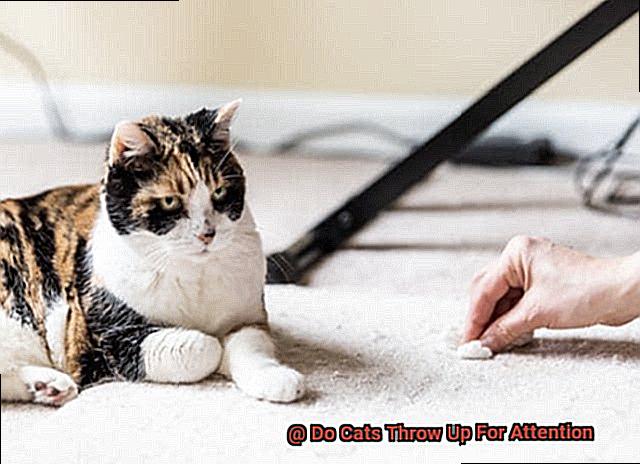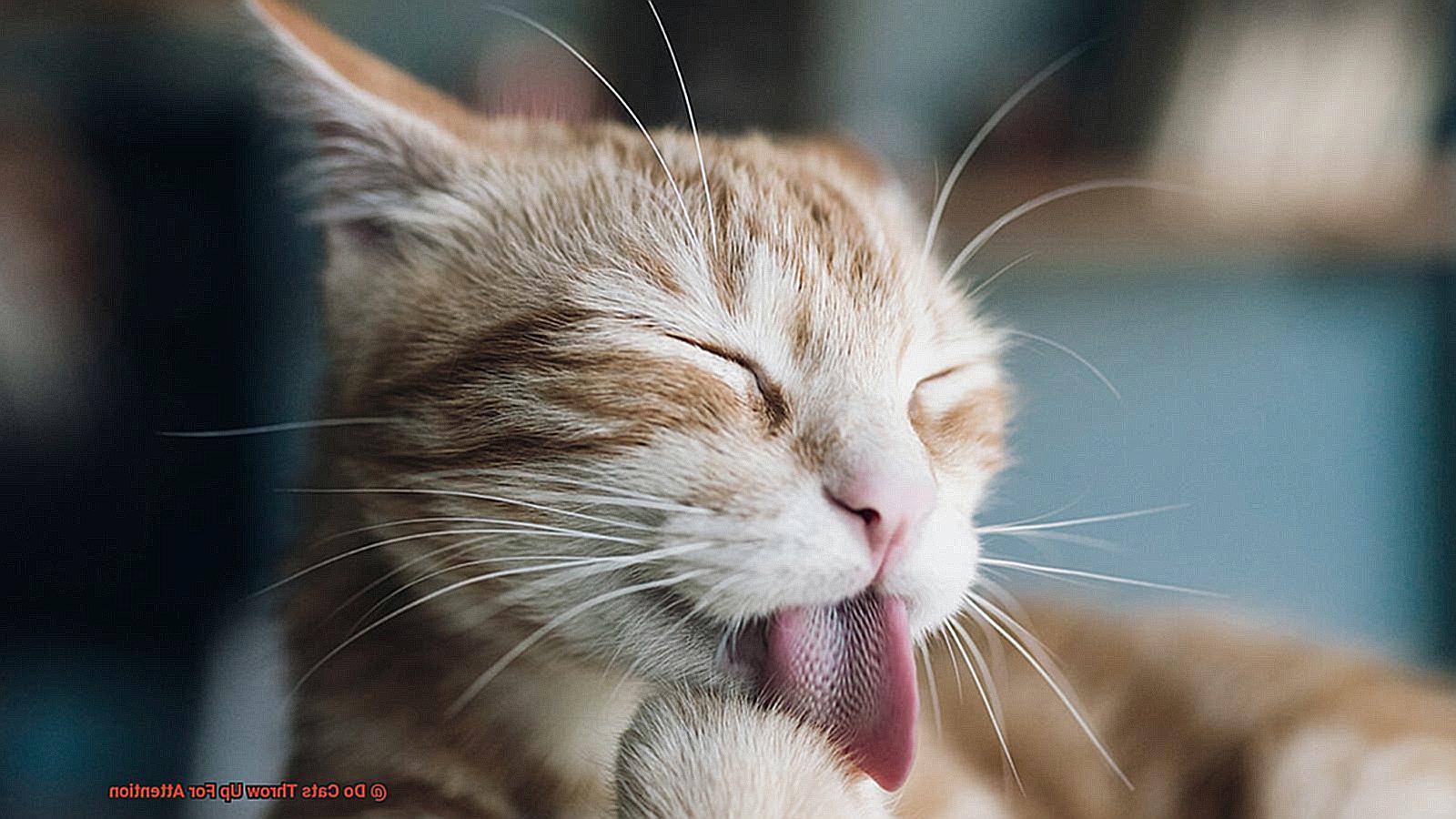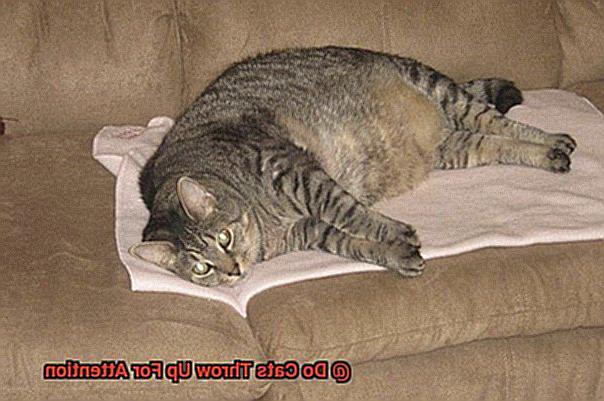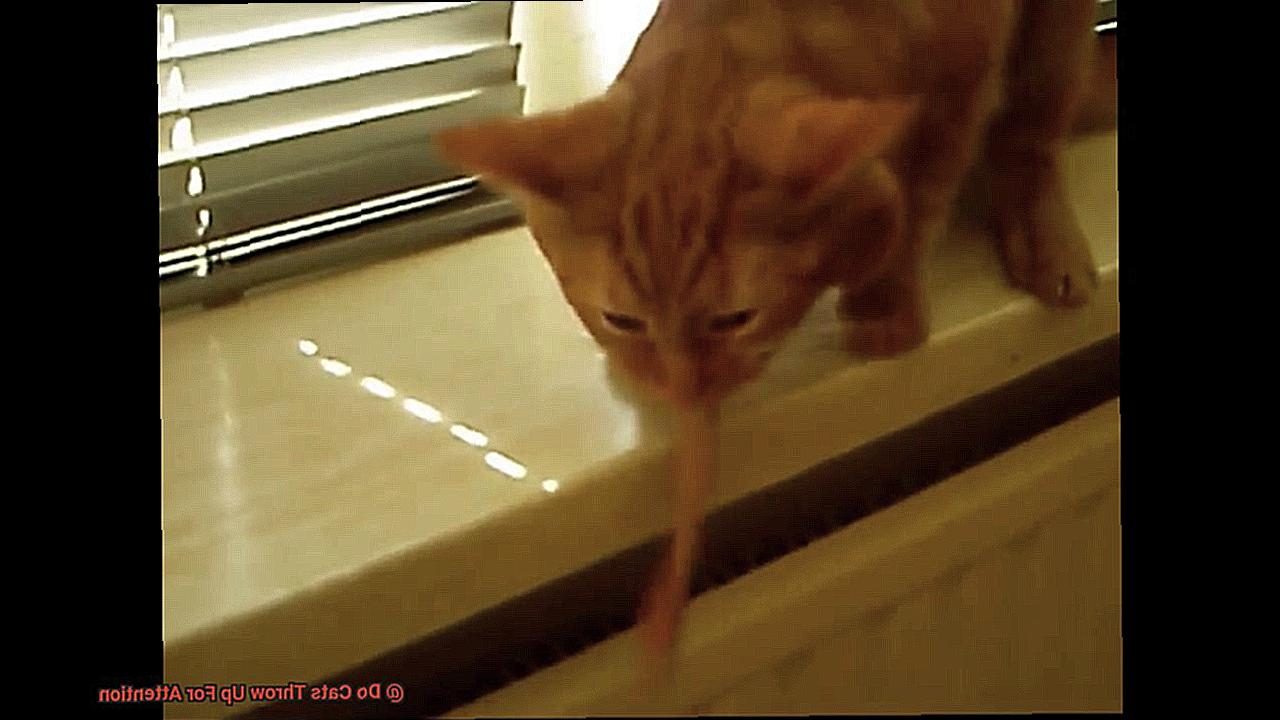Do you find yourself constantly cleaning up your cat’s vomit? Are you starting to wonder if your feline friend is purposely throwing up just to get your attention? As a devoted cat owner, it’s important to understand the reasons behind your cat’s vomiting and whether or not it’s a sign of attention-seeking behavior.
While there are various reasons why cats may experience vomiting, some owners believe that their pets are using this tactic as a manipulation tool. Whether it’s for food or affection, some cats may resort to throwing up in hopes of getting what they want. However, it’s crucial to separate fact from fiction and understand the true motivations behind this behavior.
In reality, vomiting is a natural process for cats to rid their bodies of harmful toxins or undigested food. Therefore, it’s important to monitor your pet’s vomiting habits and be aware of any potential health issues that could arise. In this blog post, we’ll delve into the reasons why cats vomit and explore when it could be genuine versus when it might be an attempt at gaining attention.
So whether you’re a seasoned cat owner or new to the world of feline companionship, grab a cup of tea and join us on this informative journey. We’ll debunk any myths about attention-seeking behavior in cats and help you better understand how to care for your furry friend when they experience vomiting.
What Causes Cats to Vomit?
Well, it turns out that there are multiple reasons why cats may throw up.
One of the most common causes of feline vomiting is hairballs. As we all know, cats are meticulous groomers and often ingest their own fur while cleaning themselves. This fur can build-up in their stomachs and cause discomfort, leading to vomiting. So, next time you hear your cat hacking up a hairball, don’t dismiss it as attention-seeking behavior; it could be a sign that they need some assistance with their grooming routine.
Another reason for cats to vomit is due to changes in their diet. Cats can be sensitive to changes in their food, and if they’re fed something new or different, it can cause them to vomit. Additionally, if their food is spoiled or contaminated, it can also lead to vomiting. So, if you notice your cat vomiting after a recent diet change or after eating something questionable, it may be time to switch back to their old food or consult with your vet.
In some cases, cats may also vomit due to underlying medical conditions such as kidney disease or cancer. If your cat is vomiting frequently or seems to be in distress, it’s crucial to take them to the vet for a check-up. Identifying the root cause of your cat’s vomiting is essential in providing them with the proper treatment.
Aside from these causes, there are other reasons why cats may vomit such as ingesting foreign objects or experiencing stress and anxiety caused by changes in their environment or routine. It’s essential to monitor your cat’s behavior and take note of any changes or irregularities in their daily routine. If you have concerns about your cat’s vomiting or think that there may be an underlying issue, it’s always best to consult with your veterinarian for advice and treatment options.
In conclusion, cats may seem like they’re vomiting for attention, but there’s usually an underlying reason for this behavior. As responsible cat owners, it’s important to pay attention to our cats’ behavior and take action if we notice any unusual symptoms.
Hairballs and Grooming Habits

Hairballs are a common issue among cats that can lead to vomiting and discomfort. But did you know that your cat’s grooming habits and hair length could be contributing factors?
Cats groom themselves by licking their fur, which is essential for their hygiene and health. However, during this process, they also ingest loose hair that accumulates in their stomachs, forming hairballs that are either vomited or passed through the digestive system. While hairballs are natural, excessive vomiting could be a sign of an underlying problem.
The good news is that regular grooming and brushing can reduce the amount of loose hair your cat ingests, ultimately minimizing the occurrence of hairballs. By brushing your cat often, you can remove loose hair before it accumulates in their stomach. This not only helps prevent hairballs but also promotes healthy skin and coat.
If you have a long-haired breed such as Persians or Maine Coons, you need to be extra cautious about grooming. Long fur is more likely to trap loose hairs and cause them to accumulate in the stomach leading to more frequent hairballs. So, make sure to make grooming a part of your routine and keep your feline friend’s fur free of loose hairs.
It’s worth noting that hairballs are not caused by attention-seeking behavior, although they are a common cause of vomiting in cats. Therefore, if you notice excessive vomiting or distress while vomiting, seek veterinary care as there may be an underlying health issue.
Diet Changes or Contamination
While hairballs are a common cause, diet changes or contamination can also be culprits of this unpleasant issue.
Cats are notorious for having delicate stomachs, and any sudden change in their diet can trigger vomiting. Whether it’s switching to a different brand of cat food or sharing human food that they’re not accustomed to, it’s critical to introduce any dietary changes gradually to give your cat’s digestive system time to adapt.
Contamination is another factor that can lead to cats throwing up. Eating spoiled or contaminated food, drinking dirty water, or even ingesting foreign objects can all be culprits. If you suspect that your cat has eaten something they shouldn’t have, it’s essential to seek veterinary attention immediately.
To avoid diet-related vomiting, opt for high-quality cat food that meets your cat’s nutritional requirements. Monitor their eating habits and ensure they’re not overeating or eating too quickly. Providing fresh water and regularly cleaning their feeding bowls can also help prevent contamination-related vomiting.

It’s crucial to keep an eye on your cat’s behavior and seek veterinary attention if you notice any concerning symptoms or behavior changes.
Underlying Medical Conditions
Vomiting is not a normal behavior for cats and could indicate an underlying medical condition. Let’s dive into some of the possible medical conditions that can cause cats to throw up and what you can do to help your beloved pet.
Hairballs are a common culprit behind feline vomiting. When cats groom themselves, they often swallow loose hairs which can accumulate in their stomach and form a hairball. This can lead to discomfort and irritation, causing your cat to vomit. To prevent hairballs, make sure to regularly brush your cat’s fur and provide them with a healthy diet that includes plenty of fiber.
Gastrointestinal issues such as inflammatory bowel disease or pancreatitis can also cause cats to throw up. These conditions can cause inflammation and irritation in the digestive tract, resulting in vomiting and other digestive symptoms. If you suspect your cat may have a gastrointestinal issue, it’s important to take them to the vet for proper diagnosis and treatment.
Other serious medical conditions that can cause your cat to throw up include kidney disease, liver disease, hyperthyroidism, and even cancer. These conditions require prompt medical attention and should not be ignored.

If your cat is frequently throwing up, seek veterinary care as soon as possible to determine the underlying cause. Your vet may perform tests such as blood work or X-rays to diagnose the issue. Treatment will depend on the specific condition but may include medication, dietary changes, or surgery.
In conclusion, if your cat is throwing up frequently, it’s crucial not to overlook it as a minor issue. Seeking veterinary care promptly will ensure that your furry friend receives the appropriate treatment they need for their underlying medical condition. By following the recommended treatment plan, you can help improve their overall health and well-being.
Symptoms of an Underlying Medical Condition
While it may seem like a minor issue, vomiting can be a sign of an underlying medical condition that requires prompt veterinary care. It’s crucial to determine the root cause to ensure your cat receives the appropriate treatment. Here are some common underlying medical conditions that may be causing your cat to vomit:
Hairballs
Hairballs are one of the most common medical conditions that cause cats to throw up. When cats groom themselves, they ingest their fur, which accumulates in their stomachs and can lead to vomiting. While hairballs are normal, excessive vomiting may indicate a more severe issue.
Inflammatory Bowel Disease
Inflammatory Bowel Disease (IBD) is another medical condition that can cause cats to vomit. IBD causes inflammation of the intestinal lining, leading to vomiting and diarrhea. Other symptoms may include weight loss, reduced appetite, and lethargy. If left untreated, IBD can lead to severe complications.
Liver disease
Liver disease can lead to a buildup of toxins in the bloodstream, resulting in nausea and vomiting. Cats with liver disease may also display jaundice, a yellowing of the eyes and skin. Early diagnosis and treatment are crucial for managing liver disease effectively.

Pancreatitis

Pancreatitis is an inflammation of the pancreas that can cause abdominal pain and vomiting. Other symptoms may include diarrhea, fever, and lethargy. Pancreatitis can be life-threatening if left untreated.

It’s crucial to remember that excessive vomiting or any other concerning symptoms should prompt you to consult with a veterinarian immediately. Seeking prompt veterinary care and following the recommended treatment plan can help improve your furry friend’s overall health and well-being.
While cats may vomit for attention-seeking behavior or due to a hairball, it’s vital to rule out any underlying medical conditions first. By being aware of these common underlying medical conditions, you can keep an eye out for any symptoms and ensure your cat receives appropriate care if needed.
When to See a Vet
When it comes to vomiting, it’s essential to know when it’s time to see a vet. While occasional vomiting may be normal for cats, frequent or excessive vomiting can be a sign of a more serious health issue.
If your cat is vomiting frequently or appears to be in discomfort while doing so, it’s crucial that you make an appointment with your veterinarian right away. Additionally, if you notice any of the following signs, it may be time to seek professional care: vomiting blood, lethargy, loss of appetite, and dehydration.
During your visit, your veterinarian will perform a thorough physical exam and run diagnostic tests such as blood work, X-rays, or an ultrasound to determine the underlying cause of your cat’s vomiting. Depending on the diagnosis, treatment options may include medication, changes in diet, or even surgery in severe cases.
It’s important to keep in mind that frequent vomiting may not just be a ploy for attention. It could be a sign of an underlying medical issue such as gastrointestinal problems or allergies. Therefore, it’s vital not to dismiss frequent vomiting as merely attention-seeking behavior without consulting with a veterinarian.
If you’re worried about your cat’s vomiting habits, it’s always best to err on the side of caution and seek veterinary care. Early diagnosis and treatment can often prevent more serious health issues from developing down the line.
MVndPT9seFE” >
Conclusion
As a devoted cat owner, it’s essential to recognize the reasons behind your feline’s vomiting episodes. Although some may assume it’s their cat’s way of seeking attention, there are several factors that could be contributing to this unpleasant issue.
Hairballs are a common cause of vomiting in cats, and regular grooming can help prevent them from ingesting too much loose fur. Additionally, switching to high-quality cat food and monitoring their eating habits can reduce diet-related vomiting.
However, if your cat continues to vomit frequently or appears uncomfortable while doing so, it may indicate an underlying medical condition such as liver disease or inflammatory bowel disease. Seeking veterinary care promptly is crucial to diagnose and treat any potential health issues early on.
As responsible pet owners, we must pay close attention to our cats’ behavior and seek professional help if we notice any concerning symptoms.

